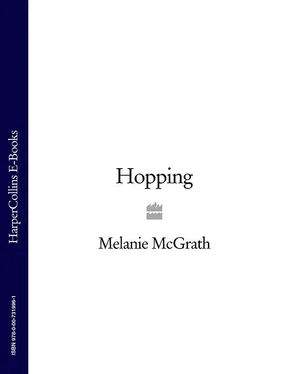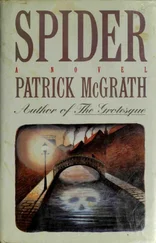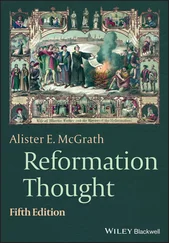The Spicers proved themselves to be kind and reasonable employers and Harold quickly and happily made himself indispensable. In the mornings he mopped and swept the pavement in front of the shop, then dusted the shelves and washed and polished the floor, before feeding and cleaning out the mynah bird. In the afternoon, he hitched up the delivery trailer to Spicer’s bicycle and took off along the streets of Poplar, delivering packages here and there. From time to time he would cycle down to the pub beside the West India to pick up consignments of molasses and black treacle, bananas and spiced rum from Jack and Henry’s store.
After some months, Spicer sold the bristling cockatiel and bought a breeding pair of Cumberland fancy canaries, and it became Harold’s responsibility to put out their white grit and seed every morning and to change their water, wipe their cuttlebone free of droppings, and lay new paper on the cage floor. There was no more talk of war heroes, nor of crippled boys. May never called her younger son fishlips again, and even his father seemed to treat him with a new respect. The Spicers, who had no children of their own, developed an affection for their errand boy and were touched by the care he took with everything, and in particular with the birds. Spring came round and Spicer made a breeding box and offered Harold a cut of the sale price of every canary chick he could bring to adulthood. Pretty soon the hen laid eggs, each of which Harold carefully removed with a spoon and replaced with a clay dummy. Once the clutch was complete, he put all the eggs back in the nest together and waited for the hen to settle on them. Of the first brood, he lost three chicks and managed to bring up two, but he was picking up tips at the bird market in Sclater Street now and he knew where he had gone wrong. With the money he made on the two he sold, he bought another breeding pair and successfully raised six chicks. He sold the males, which were the only singers, and kept the females for breeding on.
Summer passed into autumn and on 11 November, the Armistice was signed and, despite the ravages not only of the war, but of the influenza which came in on its coat-tails, the whole of the East End devolved into one giant street party. Young men not yet drafted laughed with relief, children boasted about their fathers, and wartime sweethearts schemed to extricate themselves from their promises.
The curtains opened, the lights came on and everyone remembered their lines. Life was on again.
There followed the briefest of booms as the economy picked itself up from the war and then a deep depression hit.
How’s about I pay yer next week, sonny boy? women would say when Harold turned up to deliver their groceries. Mr Spicer won’t mind a bit . Sunken-eyed mothers would come into the shop with their crying children carrying the most pitiful array of shabby goods – a baby’s rattle, a spinning top, a rabbit’s foot good-luck charm – to trade for food, and Spicer would have to take them to one side and remind them sternly that it was a business he was running and if they wanted charity they should apply to the Sally Army.
Them politicians have got a lot to answer for , Mrs Spicer said. Ain’t those poor women got enough on their plates? Half of them widows and all .
But that’s just it, Mrs Spicer , Spicer replied, shaking his head at the way of things. Most of ’em ain’t got nothing on their plates at all .
Things got so bad that on one day in 1921, four members of Poplar council were arrested for diverting the rates into a food voucher scheme designed to protect Poplar’s poorest residents from starvation. When news spread of the councillors’ arrest, men and women in the docks and factories began putting down their tools and taking to the streets. Spicer watched them moving slowly past the shop windows and tutted with disapproval. Things were bad, he knew, but there was no need to make a public scandal of it. Besides, the demonstrators were putting off his customers.
At lunchtime that day, Mrs Spicer put on her coat and brown cloche hat and announced she was going to the post office. Spicer tried his best to persuade her not to go, but she was insistent. By late afternoon, when the demonstrations and street protests had spread across Poplar and even the rookeries and turnings were jammed with aggrieved men and women, jostling for a view of their leaders, and Mrs Spicer had not returned, Spicer sent Harold out on the bicycle to look for her. For several hours, Harold slowly pedalled through the throng, along the Commercial Road, down the East India Dock Road into Poplar High Street and farther east to Blackwall and the oxbow of land at Bow Creek where the river Gypsies lived, weaving his way through the tides of people, but he saw no sign of Mrs Spicer until, making his way home, he was bicycling down Poplar High Street when he thought he spotted her brown cloche hat among a group outside the town hall. He clambered from his bicycle and, leaving it in the care of a boy in return for a farthing, he made his way through the throng of people until finally there, over on the other side of the street, next to the slipper baths, his suspicions were confirmed. Mrs Spicer was standing with the protesters. She had a banner in her hand and was shouting. He knew then she had never intended to visit the post office but needed an excuse to leave the shop. In her own quiet way Mrs Spicer was a rebel; most likely she’d been a rebel all her life. Harold found the idea exotic. Until that moment he had thought that rebels were all like Jack.
He reported back to Mr Spicer that his wife was nowhere to be seen and that she was probably caught up somewhere in the tide of people, but he saw no need to worry because no one seemed to be much in the mood for violence. It was all right to lie to keep a secret, he thought, to avoid hurting people. Sometimes, it was probably better than telling them.
Later on that week, he lifted his new clutch of young canaries into an old wooden port box, tied it to his bicycle with string, and pedalled along the Commercial Road, past the soup lines at the Sally Army, past thin men standing smoking on the corners, past sallow-skinned women and tearful children to the animal emporium in Sclater Street, where he sold all four, and throughout the whole journey it never once occurred to him that it might be an odd thing, in the midst of such poverty and misery as there was in the East End of the 1920s, that men and women would happily give what little money they had to possess just one of those tiny, yellow gems, whose song recalled sunshine and laughter and better times.
CHAPTER 4
On their return from Kent and all through the war years, Daisy and Franny visited Elsie at her Wanstead Flats asylum once a month with Joe. Sometimes they’d take a rock bun or a piece of Mrs Anderson’s tea loaf, but after Mrs Anderson and Maisie left for alternative lodgings nearer to Mrs Anderson’s sister, there was rarely anything worth taking. Elsie didn’t seem to bother one way or another. Every so often her face would beam with recognition, but most times she seemed confused and mildly irritated, as though their presence interrupted her peace. No one had any real idea what was wrong with her. The diagnoses ranged from nervous exhaustion to hysterical grief and melancholic disorder. She was prescribed complete rest for an indefinite period. Whether she would recover or not was anyone’s guess. Still, the asylum was warm, the nurses seemed kind and the food was plentiful, and Daisy often thought her mother was happier in her walled prison, shorn of memories, than she had been on the outside, though she knew enough never to say this to her father.
Without Elsie’s luxuriant moaning and numberless afflictions, life at number 7 Bloomsbury Street felt oddly amputated but it, too, was happier, especially for Daisy, who had always suffered the hard edge of her mother’s misery.
Читать дальше












